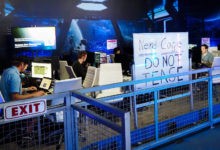Institutional DeFi Startup Hashnote Is First to Emerge From Incubator Cumberland Labs

Decentralized asset management platform Hashnote, the first company to be launched by Web3 incubator Cumberland Labs, joins the current trend for grown-up, institutional-grade decentralized finance (DeFi).
Hashnote, which simplifies much of DeFi’s complexity and comes compliant with things such as know-your-customer (KYC) requirements, is backed with $5 million of investment from Cumberland Labs, which came out of stealth mode in July. Chicago-based crypto trading giant Cumberland – the crypto trading firm affiliated with diversified trading firm DRW – will be the first of a select group of market makers on the platform.
Decentralized lending and trading stayed robust amid last year’s collapsing dominoes of centralized crypto companies, but the DeFi space has lacked the kind of traditional finance-like infrastructure to which big institutions are accustomed. This made Hashnote’s traditional finance (TradFi) offering feel like an easy sell, said the firm’s founder and CEO Leo Mizuhara in an interview with CoinDesk.
«Last year showed the crypto space wasn’t run by adults, but rather some of these young personalities who’ve never really spent much time in finance,” Mizuhara said. “After spending 12 years as deputy [chief investment officer] at Bank of America, I joined DRW where I ran the systematic options trading group. And when I came up with the idea for Hashnote, Don Wilson [DRW founder and CEO] loved the idea, wanted to fund it immediately and had a term sheet in front of me within a week.”
Hashnote is regulated in the U.S. by the Commodities Futures Trading Commission (CFTC) as a commodity pool operator (CPO). Internationally, Hashnote is registered under the Cayman Islands Monetary Authority (CIMA) which means all its funds are KYC’d and fully whitelisted, Mizuhara said.
Cumberland Labs is an independent entity based in Singapore, said the incubator’s head of strategy Tama Churchouse.
“We’re not a subsidiary of Cumberland but obviously work closely with companies like DRW,” said Churchouse in an interview. “We work with external founders, where typically there is a large first check investment for a substantial equity position in companies where we can add a genuine competitive advantage with Cumberland and DRW. That means a deep involvement in trading, market making, engineering algorithmic systems, low latency, the whole nine yards.”






 Bitcoin
Bitcoin  Ethereum
Ethereum  Tether
Tether  USDC
USDC  TRON
TRON  Dogecoin
Dogecoin  Cardano
Cardano  Monero
Monero  Bitcoin Cash
Bitcoin Cash  Chainlink
Chainlink  LEO Token
LEO Token  Stellar
Stellar  Zcash
Zcash  Litecoin
Litecoin  Hedera
Hedera  Dai
Dai  Cronos
Cronos  OKB
OKB  Tether Gold
Tether Gold  Ethereum Classic
Ethereum Classic  KuCoin
KuCoin  Cosmos Hub
Cosmos Hub  Gate
Gate  Algorand
Algorand  VeChain
VeChain  Dash
Dash  Stacks
Stacks  Tezos
Tezos  TrueUSD
TrueUSD  Decred
Decred  IOTA
IOTA  Theta Network
Theta Network  Basic Attention
Basic Attention  NEO
NEO  Synthetix
Synthetix  Qtum
Qtum  Ravencoin
Ravencoin  0x Protocol
0x Protocol  DigiByte
DigiByte  Zilliqa
Zilliqa  Nano
Nano  Siacoin
Siacoin  Holo
Holo  Numeraire
Numeraire  Waves
Waves  Ontology
Ontology  Enjin Coin
Enjin Coin  Status
Status  BUSD
BUSD  Hive
Hive  Pax Dollar
Pax Dollar  Lisk
Lisk  Steem
Steem  Huobi
Huobi  OMG Network
OMG Network  Bitcoin Gold
Bitcoin Gold  NEM
NEM  Augur
Augur  Bitcoin Diamond
Bitcoin Diamond